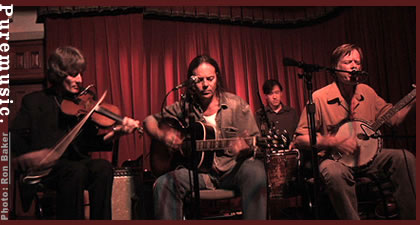
A Conversation with
Kevin Welch
(continued)
PM: If I may be so bold, the dynamic of the group seems to allow, or even encourage, a kind of a mystical side of the principals to emerge. Even "I Wish I Had That Mandolin," that song could have seen a much more straight ahead approach in a lot of groups, or in a different time. But how it starts with that cymbal swell setting the atmosphere, it's really trippy, how it lends meaning to you singing about your little voice talking and so forth. It's a very atmospheric group for what you could call a folk group. It's got a lot more happening in terms of ambience.
KW: Yeah, it does. I can't say that that's necessarily deliberate. We don't really talk about stuff. We don't really discuss very much what anybody ought to do, really. There's no preproduction. Most of the songs when we record them we haven't learned them yet. There's a couple of things on this record that we had been fooling with on the road. And I'm not even saying that this is the right thing to do. I'm just saying it is what we do. We just try to keep our brains out of it.
PM: Right. Yeah, it's the wrong tool for the job.
KW: Well, it really is. It really is. So you do hear a lot of different influences kind of showing up. Kieran's approach to the banjo has got a whole lot more to do with Bo Diddley than it does Earl Scruggs, for instance.
PM: [laughs] Or Doc Boggs, right.
KW: Yeah.
PM: That's funny.

KW: And Fats, well...
PM: Oh, yeah, Fats, if anything leans toward the mystical side or the eastern side, he'll pull out a sitar or an oud, or whatever.
KW: Yeah. That's true.
PM: In fact, I was really tickled when I saw the band at the Basement some months ago and he had an oud with him.
KW: Right.
PM: Wow, I mean, that's just one of my favorite instruments in the world, and he was playing the living hell out of it.
KW: Yeah, I'd have to say, I mean, he had only just had gotten that thing. It seems like it was only a couple weeks before we made the You Can't Save Everybody record. He hadn't had it very long at all. And he pulls it out and we start recording a song called "Mr. Bones." And the next thing I knew he was just--like you said, I mean, he was just playing the dog shit out of that thing.
PM: [laughs] He's just like that. And he's a real prince; very egoless for a guy who can play so many things.

KW: Yeah. When we all play together, there are a lot of musical conversations going on. Like you'll hear when somebody will almost suggest something, and you answer back. And it allows us to take these things off into different directions on different nights. Certain songs in particular are sort of designed to just let us experiment. Some of the arrangements we'll pretty much stick to, and just try to tighten them down through playing and so forth. But other songs are really there for us to be able to just take off. And we'll change time signatures, or change grooves, and change tempos. The only thing we don't change, we never change keys when we're playing. But other than that, everything else is pretty much up for grabs.
PM: I do like that.
I was going to ask this of whomever I got on the mic, and I'm tickled that it's you because I wanted to know it about you: what kind of a home and a family did you grow up in, and when did music first take a hold of you in a way that would change your life?
KW: Well, I was raised in a traveling family. The first seven years of my life, we just stayed out pretty much on the road. We estimated something over 70 different places that we lived by the time I was seven.
PM: Holy jeez.
KW: But right toward the end of that--I think at the time we were in Pennsylvania, my mom brought home an Elvis Presley record, and that was it for me. I decided right then I was going to be a musician.
PM: Wow.
KW: But I was the only musician in the family. We ended up in Oklahoma where I discovered Woody Guthrie, who grew up right down the road from where we were. And that combined with all I wanted to do was play music, and really, really related to the Guthrie stuff because--I don't know, just kind of my formative years were spent on the move like that. I think I read Jack Kerouac and Woody Guthrie the same summer.
PM: What a beautiful summer.
KW: Yeah. So when I was about 17, I got back on the road again with a bluegrass band, and eventually ended up in Nashville with a writing gig. Kieran and I moved to Nashville virtually the same time.
PM: What year was that?
KW: It would have been...I want to say '78. So we were both young writers at Tree. And I had the benefit of all the great writers that were hanging out in that building through those years. It was really a songwriting school to go to.
PM: Unbelievable.
KW: There was a lot of good songwriting going on in those days up and down Music Row.
PM: Yeah, I certainly remember when I first got to town in '89, that you were one of my favorite songwriters on the scene, and made a big impression on me.
KW: Thanks, Frank.
PM: Absolutely.
print (pdf) listen to clips puremusic home
